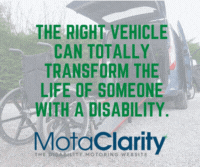

Parking on street
Your Blue Badge is legaly recognised when you park in an on street bay only. The regulations will cover England Wales, Scotland and Northern Ireland.
These Regulations cover traffic orders which are made by local authorities under various sections of the Road Traffic Regulation Act 1984, and which lay down parking restrictions or impose parking charges on motorists. The effect of the Regulations is to require local authorities to include in such orders certain exemptions in favour of vehicles displaying a Blue Badge. This includes:
• allowing badge holders to park free of charge and without time limit at ‘on street’ parking meters and pay-and-display machines;
• allowing badge holders to park free of charge and without time limit at ‘on-street’ disabled parking bays, unless signs say otherwise.
• allowing badge holders to park on single or double yellow lines for example up to three hours in England, Wales and Northern Ireland or for unlimited period in Scotland , unless there is a ban on loading or unloading.
For more information where you can park go to:
Blue Badge rights and responsibilities England
Blue Badge rights and responsibilities Wales
Blue Badge rights and responsibilities Northern Ireland
Blue Badge rights and responsibilities Scotland
PARKING Off STREET
The Biggest thing to remember when parking in an off street car park is that the Blue Badge Rules do not apply in the same way they do on-street. You will always need to check the rules for Blue Badge holders in an off-street car park. You will need to check if fees will apply or not and also if there are any time restriction on how long you are able to park. Do not assume that displaying your Blue Badge will allow you to park for 3 hours this is not always the case. If the car park restricts you to a different length of time you must follow this or you may be issued a ticket.
You need to also be aware that road systems on private land, not run by a council, have different rules to the main public highway. Yellow lines on private land are not allowed to be used the same way as they can on the public highway. You are not able to park on these unless the land owner has said otherwise and doing so could result in a PCN being issued.
Off street or car parks on private land can be managed by either a Local Authority where the rules of traffic law will apply.
Alternatively it could be managed by a private company where the rules of Contract Laws will apply and they will issue their own parking tickets. The rules about issuing and appealing these tickets are different to the rules about tickets issued by a local authority.
When you park on private land managed by a private operator (e.g. shopping centres, cinemas, supermarkets etc.) it is important to check signage for terms and conditions of each car park; they can vary dramatically from car park to car park.
Parking on private land is managed under the Law of Contract and Trespass and only the driver can enter into a contract or commit the act of trespass. The Protection of Freedoms Act 2012 (which introduced ban on clamping in England and Wales, in Scotland ban on clamping was introduced in 1992, there is no ban on clamping in NI) does not change this principle. However, if the driver cannot be identified the operator can seek payment due from the registered keeper as a result of the breach of contact. This is different from road traffic law where the keeper is responsible in law regardless of who was driving at the time.
It is worth reminding car park operator about their legal obligations to make reasonable adjustments for disabled people as stated in the Equality Act 2010. It states that service providers are to take reasonable steps to ensure that disabled people do not find impossible or unreasonably difficult, to enjoy the service on the same basis as non-disabled people. This has implications for car park operators, who may have to demonstrate that as well as marking out disabled people only parking spaces, they have taken reasonable steps to ensure that they are available to disabled people.